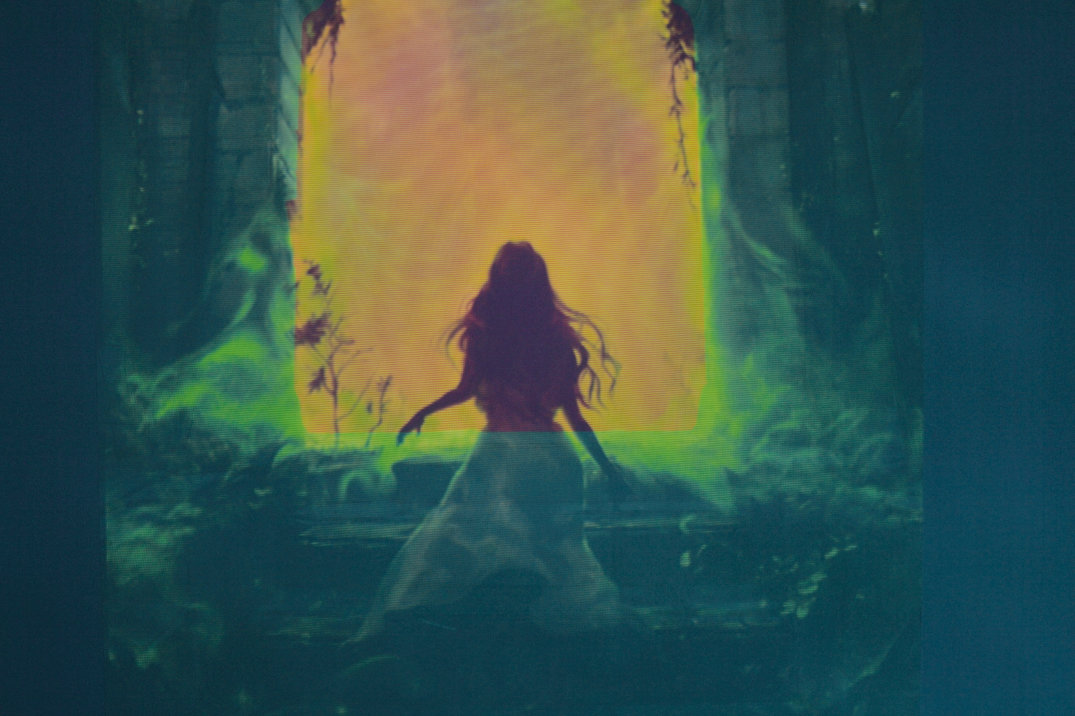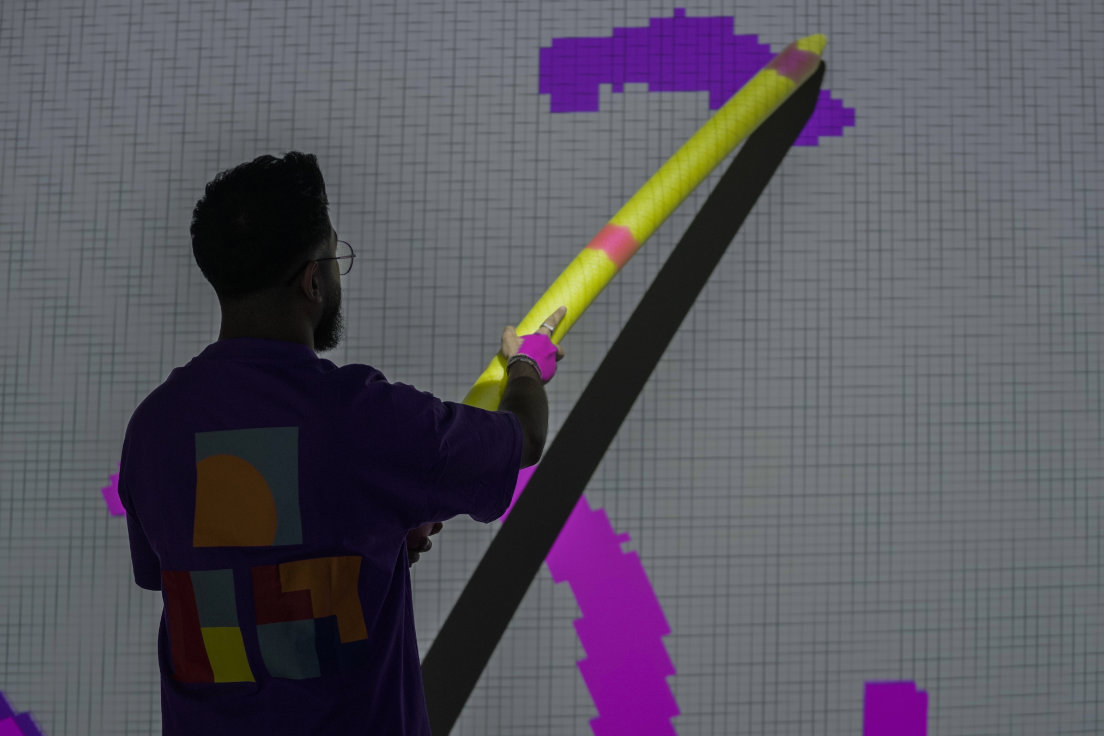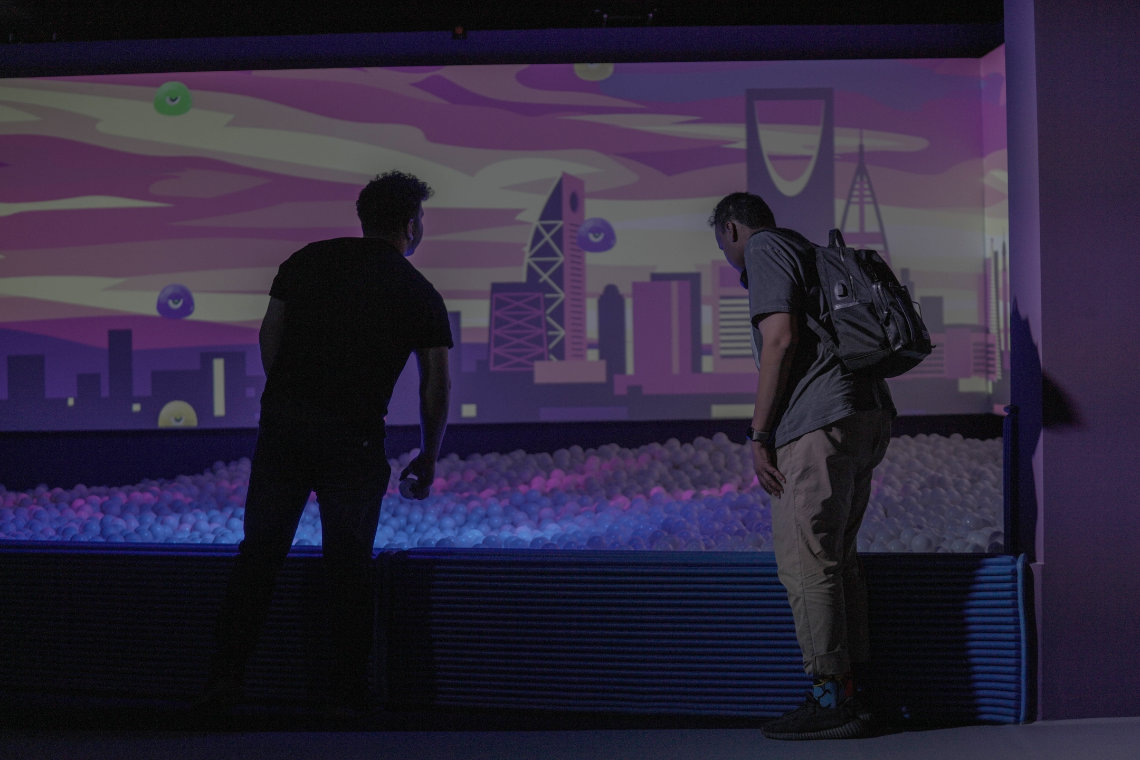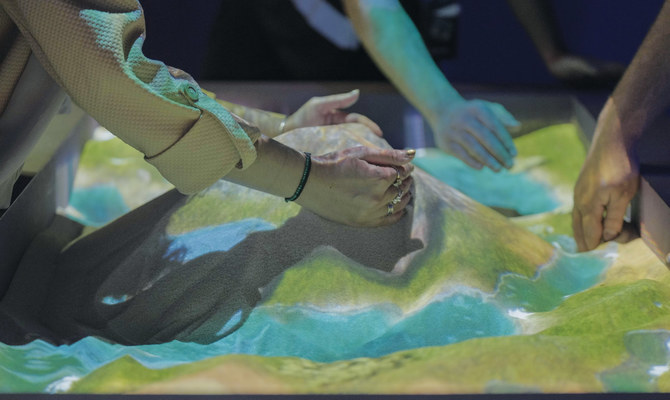RIYADH: Creative artworks and state-of-the-art installations by Saudi artists at Artorama are offering visitors a unique immersive experience.
Artorama, Nowaar Entertainment’s latest event, will run until Oct. 21 in Riyadh’s Laysen Valley.
The first zone features distinctive designs from five Saudi artists. The visitor must physically touch the designs to view the artworks in their full, colorful glory.
“Eternal Light” by Ameera Sheikh was originally executed as the cover for the yet-to-be-published novel by Sara Al-Hussain. It tells the story of a young girl who sets off on a journey to uncover a mysterious power as she faces unknown evils ahead.
“I wanted to show the magical and mysterious environment but with an ominous and an unsettling feeling that makes you feel a little anxious as you are drawn into the piece, just like our heroine,” Sheikh told Arab News.
The artist was told in the past to leave Saudi Arabia in pursuit of job opportunities abroad, but she saw the great potential for a better future at the time, which has now proven to be the case for aspiring artists.
“I feel very grateful for being patient. We had a little community of artists here where we helped each other improve by hosting small galleries and gatherings to keep it active and help it grow,” she said. “Now our community has a very powerful impact both globally and locally, and this has been strengthened by the current growing embrace of art and artists in the country.”

‘Eternal Light’ by Ameera Sheikh tells the story of a young girl who sets off on a journey to uncover a mysterious power as she faces unknown evils ahead. (AN photo by Huda Bashatah)
In illustrator Ethar Balkhair’s piece, the visitor’s touch brings two figures to life in an explosion of color, highlighting the cultural and social aspects of Al-Balad, Jeddah’s historical area. “Jeddah is all about color. I really wanted to reflect the spirit of Al-Balad in this art. At the same time, I wanted to tell the story of Hijazi people,” she told Arab News.
Balkhair was born into a family with a passion for art; one of their household activities was to sit down and draw together. Her collaboration with Artorama was the first opportunity for her to showcase her illustrations in a local setting, but her work has reached far beyond Riyadh, with big names such as Vogue and Bobbi Brown featuring her art.
“Recently, with the initiatives from the Ministry of Culture and others, people have a chance to release the art that’s inside of them. Now, everyone has a space. In Saudi Arabia, the art scene is only growing,” Balkhair said.

The event allows visitors to indulge in their senses and experience art in immersive and innovative ways. (AN photo by Huda Bashatah)
“Artwork doesn’t just have to center around beauty. There’s a story behind it. Now, they’re shedding light on the artist behind the art, and that supports us even more, makes us more confident, and allows us to explore more without fear,” she said.
Mahmoud Zaini’s “Human Sustainability” takes a deep dive into the ethics and future of modern technology. The eccentric piece, drawn in 2017, raises awareness of the tech industry’s impact on humanity. “I was extremely disgusted by our trajectory as a race. Eventually, technology will turn us into cogs in its machine. I decided, therefore, to illustrate that concept with this contraption that recycles everything coming in and out of this ‘consumer’ to grant him a more sustainable existence,” Zaini told Arab News.
HIGHLIGHTS
• The first zone features distinctive designs from five Saudi artists. The visitor must physically touch the designs to view the artworks in their full, colorful glory. Zone 1 also has an infinity room and a photo booth station, where visitors can engage with dynamic backgrounds.
• Zone 2 features a variety of attractions including a ball pit with interactive games, a projection drawing station, 3D printing, immersive swings and a volcano sandbox, where both children and adults can learn more about the science of volcanoes.
• Anamorphic projection mapping technologies in Zone 3 utilize high-power projectors to give visitors the illusion of seeing the building’s interior while standing outside of it.
The artist expressed his delight with the General Entertainment Authority’s interest in highlighting the topic. “I am extremely happy with the trajectory we’re headed in as citizens of the Kingdom, where art pieces are appreciated and dialogue around them is fostered. What an incredible time to be in as a Saudi artist interested in big questions,” he said.
Zone 1 also has an infinity room and a photo booth station, where visitors can engage with dynamic backgrounds. Exhibition-goers can color and design their own race car, which is then scanned and projected as if racing through the streets of Riyadh.
Zone 2 features a variety of attractions including a ball pit with interactive games, a projection drawing station, 3D printing, immersive swings and a volcano sandbox, where both children and adults can learn more about the science of volcanoes as they build their own. Anamorphic projection mapping technologies in Zone 3 utilize high-power projectors to give visitors the illusion of seeing the building’s interior while standing outside of it.

The event allows visitors to indulge in their senses and experience art in immersive and innovative ways. (AN photo by Huda Bashatah)
“This event releases the inner kid inside of us. We all like to play, we all like to experiment, and this is a good place to test that out,” Khalid Sonbol, one of the project managers at Nowaar Entertainment, told Arab News.
Artorama was one of the winning pitches under the General Entertainment Authority’s “Ideas for Entertainment” initiative in 2021, which aimed to empower 20 Saudi projects centering around entertainment activities and preserving Saudi heritage for future generations. Nowaar Entertainment seeks to amplify Saudi voices, showcasing exclusive works by Saudi artists and creators around the Kingdom — even in their product gift shop. “We’re interested in showing what we have in the Kingdom,” Sonbol said. “We believe entertainment is necessary. Most people used to travel to have an actual entertaining experience. They would go to museums, parks. Now, we don’t need that. We have that here,” he said.
















